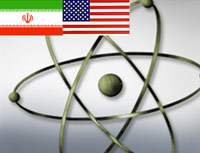Iran’s decision to expand nuclear program pushes USA to seeking tough measures
The U.N. nuclear agency's confirmation that Iran has expanded its uranium enrichment program set the stage for difficult negotiations on new U.N. sanctions, with the United States, Britain and France again likely to seek tougher measures than Russia and China will accept.

Senior diplomats from the five permanent Security Council nations and Germany will meet on Monday in London to start work on a new resolution to try to pressure Iran to suspend enrichment, which can lead to the production of nuclear weapons.
U.S. Undersecretary of State Nicholas Burns, who announced the London meeting in Washington, said Iran was "effectively thumbing its nose at the international community" and a new resolution was needed to "see Iran repudiated again."
He said it was too soon to say what provisions the resolution might contain.
Russia's U.N. Ambassador Vitaly Churkin said he had "no substantive comment" on the International Atomic Energy Agency's report Thursday which concluded that "Iran has not suspended its enrichment related activities" as the Security Council demanded in a resolution adopted on Dec. 23. But he reiterated Moscow's desire for a diplomatic negotiated solution, the AP said.
"We should not lose sight of the goal - and the goal is not to have a resolution or to impose sanctions," Churkin said. "The goal is to accomplish a political outcome."
The IAEA began probing Iran's nuclear activities more than four years ago, after revelations of nearly 20 years of secret work that included plans to enrich uranium. Since then, it has made several worrying finds, including Iranian experiments with plutonium, unexplained traces of enriched uranium, and a document showing how to mold uranium into the shape of nuclear warheads.
Last June, the six nations offered Tehran a package of economic incentives and political rewards if it agreed to consider a long-term moratorium on enrichment and committed itself to a freeze before negotiations on its nuclear program. Tehran refused to comply with an Aug. 31 deadline to suspend enrichment, insisting its program is aimed solely at producing nuclear energy.
The Security Council responded by unanimously adopting a resolution on Dec. 23 after two months of tough negotiations imposing sanctions on Iran for refusing to suspend enrichment. It ordered all countries to stop supplying Iran with materials and technology that could contribute to its nuclear and missile programs and to freeze assets of 10 key Iranian companies and 12 individuals related to those programs.
The council warned it would adopt further nonmilitary sanctions if Iran refused to complyand thatis what members will now be considering.
During negotiations on the December sanctions resolution, the U.S. administration pushed for tougher penalties but Russia and China, which both have strong commercial ties to Tehran, and Qatar, across the Gulf from Iran, balked.
To get their votes, the resolution dropped a ban on international travel by Iranian officials involved in nuclear and missile development and specified exactly which items and technologies were banned.
Several council diplomats have stressed the importance of maintaining council unity on a new resolution - even if means sacrificing tougher sanctions.
Stressing the importance of unity, U.S. deputy ambassador Jackie Sanders said Thursday "we do need to ratchet up the pressure and Iran needs to see an international community that stays coordinated and showing common purpose to have them stop what they're doing in developing nuclear weapons."
French Foreign Minister Philippe Douste-Blazy echoed the importance, saying, "unity and firmness are ... the only effective instruments we have to get Iran to turn toward the international community, and away from isolation."
"We support a second resolution, to be passed unanimously by the Security Council, to continue sanctions," he said.
British Foreign Minister Margaret Beckett said her country would consult with other Security Council members on the next steps, adding: "We remain determined to prevent Iran acquiring the means to develop nuclear weapons."
Two diplomats, speaking on condition of anonymity because negotiations have not even started, spoke of an "incremental" strengthening of sanctions in a new resolution to ensure that unity is preserved.
Diplomats said the measures under consideration include a mandatory travel ban against individuals on the U.N. list, new individuals and companies subject to sanctions, additional prohibited items, economic measures such as a ban on export guarantees to Iran, and an expansion of the nuclear embargo to an arms embargo.
The permanent council members believe the initial sanctions have had some positive effects. Iran now says it wants negotiations, though it still refuses to suspend enrichment.
Whether new sanctions can bring Tehran to comply with the council's demands remains to be seen.
"It's Iran's refusal to talk which right now has gotten Iran in a lot of hot water," said Burns, the U.S. State Department official. "Iran is increasingly isolated, and we hope Iran is going to choose negotiations."
If it doesn't, he said, it will see an escalation of financial and other sanctions.
Subscribe to Pravda.Ru Telegram channel, Facebook, RSS!

